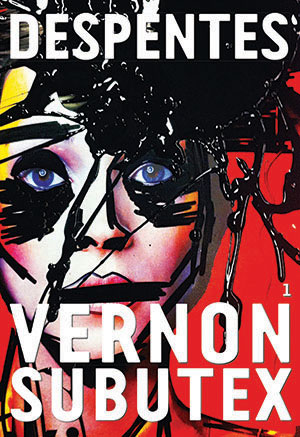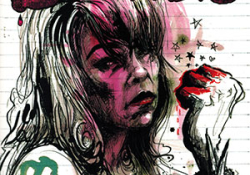Vernon Subutex (2 vols) by Virginie Despentes
 Paris. Grasset. 2015. 396 & 382 pages.
Paris. Grasset. 2015. 396 & 382 pages.
As if she were a manic, female counterpart to Michel Houellebecq, Virginie Despentes’s novels overflow with violence, second-wave feminism, and restlessness to the point of mania. As she declared in her memoir-cum-manifesto, King Kong Theory, “being Virginie Despentes is a more interesting business than anything else going on out there.” Her first novel, Baise-moi, was turned into a film full of murderous women and rape; her last novel, Apocalypse bébé (see WLT, Mar. 2011, 60), was shortlisted for the Prix Goncourt and won the Prix Renaudot; and now she is in the middle of a trilogy.
This magnum opus, Vernon Subutex, is visibly inspired by contemporary television dramas, and the wide cast of characters and sweeping arcs of each volume call to mind the epic scope of The Wire. Much like a television studio, Despentes has found herself working in three time frames. She originally submitted a large manuscript to Grasset, her publisher, with plans to trim it, but her editor advised her, instead, to split it into two volumes, whereupon she realized that a third volume would be needed. And so, as the first volume came out in January 2015, she was simultaneously working on edits to the second volume (which would come out five months later) and fresh material for the third volume (which is slated for the fall of 2016).
The title character, Vernon Subutex, is a fifty-year-old former record shop owner. The first volume begins as the famous musician Alex Bleach, who has been paying his rent and helping him out, is found to have died mysteriously. Vernon gets kicked out with barely any belongings—although he does have raw footage of Beach’s final interview, done while high on cocaine. Vernon leaves the recording with the first person he stays with, and the book follows him as he stays with various friends and acquaintances—most memorably in a huge apartment owned by a trader, where he DJs for a wild rave—and it is these various characters who give Vernon Subutex its extraordinary scope. Despentes effortlessly slips in and out of these various lives, deftly switching styles each time (one chapter is as harsh as Bukowski, another as precise as Ernaux), and in so doing creates a new Comédie humaine depicting the various social milieux of the early twenty-first century. By the end of the first book, rumors have grown around the interview Vernon once had, and as he tries to recover those tapes he ends up on the streets once and for all.
Volume 2 has Vernon Subutex homeless and wandering around the Parc des Buttes Chaumont. Here, Despentes’s prose moves more slowly. Her attention has turned from these characters’ self-absorbed lives toward larger questions of politics and class stratification within France. But there’s also a great deal more action. A friend of Vernon’s, the Hyena (who appeared in Apocalypse bébé), manages to recover the footage of Alex Bleach’s interview, and their viewing of the tapes reveals many astonishing things. Volume 3 promises to be an apocalyptic climax.
Jeffrey Zuckerman
New York City










































